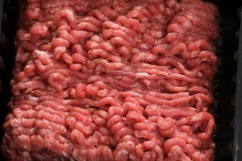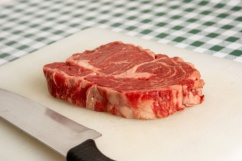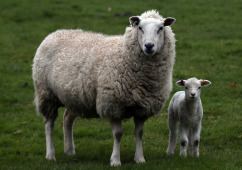Meat News
Morrisons was celebrating after scooping the top title in the annual British Turkey Awards last week.
The Bradford-based business took home the title of Retailer of the Year, beating off strong competition from Asda, Tesco, Sainsbury’s and The Co-operative, with judges unanimously deciding the chain offered a great range of turkey products year-round, with Asda following a close second.

Morrisons was also successful in the Best Christmas Traditional Product, with its Fresh Turkey, while rival Asda took home the Best Christmas Premium category with its Blue Slate Turkey.
Sainsbury’s also did well on the night, with its Turkey Breast and Thigh Joint with Cranberry and Apple Stuffing, Topped with Cranberry and Apricot being declared the Best Christmas Convenience Product, while its Thigh Joint with Herb and Cranberry Crumb took the title of Best Meal Solution.
Paul Kelly, chair of the British Turkey Federation, said: “The 2014 British Turkey Awards has once again been very exciting and I would like to extend my congratulations to all the deserving producers and retailers who are working hard to put the very best turkey products on our plates both at Christmas and the rest of the year. Winning products will be flagged up to customers on packs using a British Turkey Awards winner logo to show they really are buying the best of British.”
The evening also raised money for the children’s medical charity Sparks, and Dravet Syndrome UK, with entertainment provided by comedian and television host Patrick Kielty.
The winners in full:
Best Meal Solution (sponsored by Hybrid Turkeys)
• By Sainsbury’s Thigh Joint with a Herb & Cranberry Crumb
Best Christmas Convenience Product (sponsored by Securcom)
• Sainsbury’s Turkey Breast & Thigh Joint with Pork, Cranberry & Apple Stuffing, Topped with Cranberry & Apricot
Best Christmas Traditional Product (sponsored by Easichick)
• Morrisons Fresh Whole Turkey
Best Christmas Premium Product (sponsored by Clarke Group Construction)
• Asda Butchers Selection Blue Slate Whole turkey
Best Innovation Christmas (sponsored by ABN)
• Sainsbury’s TtD Norfolk Black Free Range Turkey Parcel. Layered With Chestnut, Maple and Thyme stuffing, Cranberries and wrapped in Oak-smoked Bacon
Best Innovation All Year Round (sponsored by ABN)
• Asda Chosen by You Turkey Mini Fillets with Brie, Cranberry Sauce & Bacon
Best Foodservice Product for Cost Sector (sponsored by Noble Foods)
• The UK Foodhall Ready to Roast British Turkey Breast
Best Foodservice Product for Profit Sector (sponsored by Noble Foods)
• Mitchells & Butler – Toby Carvery – Carvery Turkey Crown
Best Ready-to-Eat Product (sponsored by Calor)
• Adlington Roasted Turkey Breast Stuffed with Ham & Wholegrain Mustard
Foodservice Operator of the Year (sponsored by Coveris)
• Mitchells & Butler – Toby Carvery
Best Blogger Recipe (sponsored by Red Tractor)
• Foodycat Alicia – Turkey B’stilla
Student Chefs of the Year (sponsored by Aviagen Turkeys)
• David Pullin of South Staffordshire College for his ‘Oasis of the Middle East’ Turkey Bonbon, Yellow Split Pea Hummus Shredded Turkey Thigh in Moroccan-Style Chutney, Saffron Couscous, Arabic Flatbread Shard and Mint Yoghurt Dip
• Jessica Marshall of Hull College for her Golden Saffron Potato Surprise with a Blanket of Rice topped with Fried Spinach and Spiced Turkey Batons coated in a Pomegranate Reduction with Ground Pistachios, surrounded by a Crab Apple and Blackberry Jam Sauce with Poached Rose-water Rhubarb
Retailer of the Year (sponsored by Zoetis)
• Morrisons
Discount retailer’s like-for-like sales also up 30% in 2013, driving pre-tax profits up 65.2% to £261m
Aldi saw its sales grow 35.7% to £5.3 billion in 2013.
Like-for-like sales were up 30%, meanwhile, driving pre-tax profits up 65.2% to £261m.
The retailer’s UK bosses, Matthew Barnes and Roman Heini, told The Daily Telegraph that the German retailer had emerged as the new “consumer champion”, that it is benefiting from a “lack of trust” in traditional supermarkets, and that its sales have actually been boosted by the price war among the ‘big four’ retailers.

The news comes as Sainsbury’s is expected to post a fall in like-for-like sales on Wednesday (1 October), while Tesco is reeling from a trio of profit warnings and the discovery of a £250m black hole in its accounts.
Barnes told the Telegraph: “As the price war has begun, our sales, market share and growth have accelerated. Customers have become so much more sceptical since the recession about the grocery market in terms of value, transparency, and special offers.
“They have been bamboozled by a price reduction from a very high level to a low level, and yet that low level is still more expensive than Aldi.
“I think that has enabled us to stand out as a bit of a shining light. You can call us a consumer champion in that respect. Customers have come to see Aldi as a business they can trust, potentially in a market where there is very much a lack of trust.”
According to the newspaper, Aldi is attracting one million more customers than a year ago. The average customer is also buying more items, with Aldi recording an average basket size of 16.9 items, ahead of 16.6 at Tesco, but behind 18.8 at Asda.
Despite this increase, the average amount spent at Aldi is £18.99 – still 22% less than the £24.37 average spend at Tesco.
A new meat brand, Upper Teesdale Limited, is taking on the supermarkets by offering farmers higher returns, while shortening the lamb supply chain.

Upper Teesdale, which has just started trading online, was set up by seven farming families in Teesdale as a reaction to concern to falling returns on hillside lambs.
The business is offering customers across the country whole and half lamb boxes priced at £160 and £95 respectively, using primarily the Swaledale sheep breed found in the mountainous regions of Great Britain, including the north Pennines.
Upper Teesdale has enlisted local abattoir and butcher’s F Simpson and Son as processors, from where the boxes will be delivered.
Paul Johnson, chairman of Upper Teesdale, reported: “This is great opportunity to purchase Swaledale Hill lamb direct from the producers and comes at a time when many supermarkets are not even making British lamb available in their stores. We believe we are offering great-tasting lamb at a very competitive price.”
The British Veterinarian Association (BVA) has reported that 90% of its vets prefer to eat British meat.
The statistics from the BVA’s Voice of the Veterinary Profession survey show that nine in 10 vets would be more likely to buy meat, fish, dairy or eggs if it was British (90%) or locally sourced (88%).

The results of the survey, released to coincide with British Food Fortnight, also showed that 71% of vets actively seek out information about the provenance of such food before making a purchase or choosing where to eat, by checking labels or asking in restaurants.
BVA President Robin Hargreaves commented: “These results show how much British vets understand and care about the importance of animal welfare and food safety, and how that affects the food we put on our plates.
“In Britain, we have some of the highest animal welfare and food hygiene standards in the world. Our members play a vital role in maintaining those standards, from production animal vets working closely with farmers to vets working in food production, who ensure the safety and quality of the food we eat.
“This experience and knowledge is reflected in what vets choose to eat themselves. It is clear from the survey that when it comes to choosing meat, fish, dairy or eggs, vets vote British.”
The environment secretary has announced that the number of people employed in the food and drink industry rose by 71,000 between 2013 and 2014.
The figures come from the latest government Food Statistics Pocketbook and show the rise in employment in the sector from the beginning of 2013 to the same time this year. The number of people working in food and drink now accounts for 13% of national employment, totalling at more than 3.6 million.

Environment secretary Elizabeth Truss said: “Britain’s food industry is an economic powerhouse driving growth and jobs. We want more people to buy British both at home and abroad.”
The statistics also revealed other positive news. The total value of food and drink exports is rising, worth £6 billion more than in 2005, currently standing at £18.9 billion. Furthermore, they showed that the value of agriculture to the economy increased by 7% between 2012 and 2013
Truss added: “We have some brilliant success stories like Step Farm in Oxford, part of an organic dairy co-op that sold a staggering 40 million pints of cheese, milk and cream to America and Europe last year, or Suma in Yorkshire who sell our organic veg to Hong Kong. We want to see more businesses like this striking deals and trading our high quality produce abroad.”
Defra said that the government was working hard to enable the food and farming industry to compete with the rest of the world. It gave examples such as cracking down on food fraud, making it easier for government departments, schools and hospitals to buy local produce, and helping businesses strike lucrative deals abroad by removing barriers to trade and opening up new markets.
The National Farmers’ Union (NFU) is encouraging producers to take to social media to bring retailers who are promoting out-of-season foreign lamb into light.

NFU livestock board chairman said British lamb should be given “pride of place” on supermarket shelves and is urging people to Tweet pictures of supermarkets failing to do so to @NFUtweets using the hashtag #BackBritishFarming.
Sercombe said: “I believe I speak for all livestock farmers when I say that I am bitterly disappointed to see that, at a time of year when there is an ample supply of fresh, tender and delicious new-season lamb available, some retailers are failing to live up to their commitments to support British farming.
“This year has seen an excellent growing season for lamb, and you would think that this would be reflected on the shelves. Instead, as the photos we have been receiving from members show, facings are still failing to promote this fantastic meat at the peak time of year. The strength of feeling farmers have on this was shown at the Royal Welsh this summer.”
Some retailers, namely Tesco, have already come under fire on Twitter for not supporting British lamb, instead choosing to promote New Zealand products
The government plans to set up a new Food Crime Unit by the end of the year, as recommended by the post-horsegate Elliott review final report, which was published today.
Professor Chris Elliott’s review, carried out in response to last year’s horsemeat scandal, has made a number of recommendations to tackle food fraud, which have all have been accepted by environment secretary Elizabeth Truss.

As well as setting up the Food Crime Unit, the government has said it will be “ensuring we have a resilient network of food analytical laboratories to test food consistently”, and “improving coordination across government to protect food integrity and tackle food crime”.
The final report said that a new Food Crime Unit, based on the Dutch model, should be created with the FSA which would become the lead agency for food crime. It continued that a strong central team and dedicated staff with specialist skills would be needed with a range of functions.
The government said the unit will be set up “to give greater focus to enforcement against food fraud in government by analysing intelligence, initiating investigations and liaising with other criminal and regulatory enforcement agencies”.
In response to the report, Truss said: “We’re taking action to make sure that families can have absolute confidence in the food that they buy. When a shopper picks something up from a supermarket shelf it should be exactly what it says on the label, and we’ll crack down on food fraudsters trying to con British consumers.”
The British Meat Processors Association (BMPA) director Stephen Rossides said: “The BMPA welcomes publication of the final report of the Elliott Review. We will need to study the report’s findings and recommendations carefully before responding in more detail.”
It is a commonly discussed subject; the average age of a UK butcher seems to be between 50 and 60. I wonder what the average age would have been in 1950 after the war?
However, there now seems to be a healthy number of younger butchers emerging in and around London. We currently have three staff – all former chefs – who have become qualified butchers due to the better hours and better living conditions. They have an added advantage over us when it comes to product development and flavour balancing. There has also been an increase in new butcher’s shops started up by keen, inspired young men, along with father-to-son(s) succession. It is certainly easier to continue an established business. One former employee of ours started a new business about four years ago, with a small budget and a lot of heart. Now he has taken over a second shop and has a very happy local customer base. But the next thing is to attract school-leavers, and show them the benefits of the meat trade.

We recently advertised for an apprentice butcher, offering a full apprenticeship. There was a very quick response from a 17-year-old, who was not currently working. His name is Jamie. He had taken a job as an apprentice electrician, but in the six months employed, he had just worked as a cashier in the electrical shop. He had never been assessed, trained or tested and felt there was no prospect of development, so he left.
During the interview, I outlined the sort of apprenticeship I had in mind, and the job role he would be doing. As I led him around the shop and preparation areas it was a new experience for him. He left, and the other members of staff met me with smiles and questions. We had been short-staffed for a few weeks, and everybody was glad to hear he was starting on Monday.
Well Jamie has been with us for four weeks, and we’re really pleased with how he is progressing. He is starting a Level 3 butchery apprentice course very shortly. He can already dice and trim some cuts. He is the youngest member of the team for a long time.
Sainsbury’s has announced new technology for its sheep farmers, which will “effectively manage parasites, increasing product quality”.

The parasite management technology, Fecpak, allows farmers real-time feedback on parasites, as opposed to sending samples away for testing, which can take time, thus allowing for more regular testing. The technology is being supplied by New Zealand company Techion Group.
According to Techion, after nutrition, parasites are the largest influencing factor on animal performance. “The problem of increasing drug resistance from parasites to the drenches designed to kill them means we have to be smarter on how and when we use them, so it’s important to make use of new technologies to make better decisions,” explained Greg Mirams, founder and managing director of Techion.
The supermarket has already piloted the technology with its sheep farmers. Gareth Owen, a Leicestershire sheep farmer who has been testing the system since December, said “Fecpak is user-friendly and puts accurate information at our fingertips, so we can make decisions sooner on whether we need to drench or not.”

Sainsbury’s is supporting the project through its Agricultural R&D Grant Scheme. Philip Hambling, agriculture manager for lamb and pork at Sainsbury’s, said: “We are delighted to support this project as it makes egg-counting more reliable. More frequent counting will give our farmers the power to make informed decisions that benefit the performance of the flock and make more effective use of anthelmintics.”